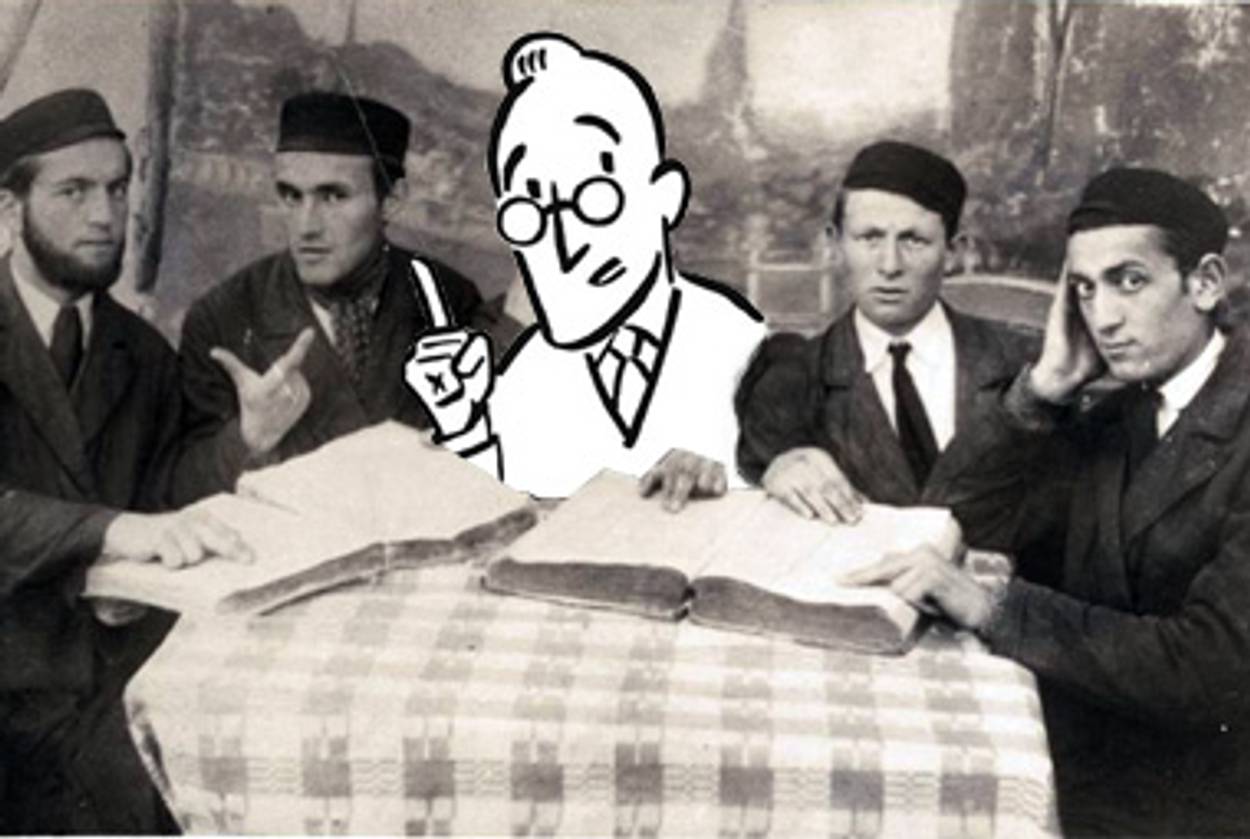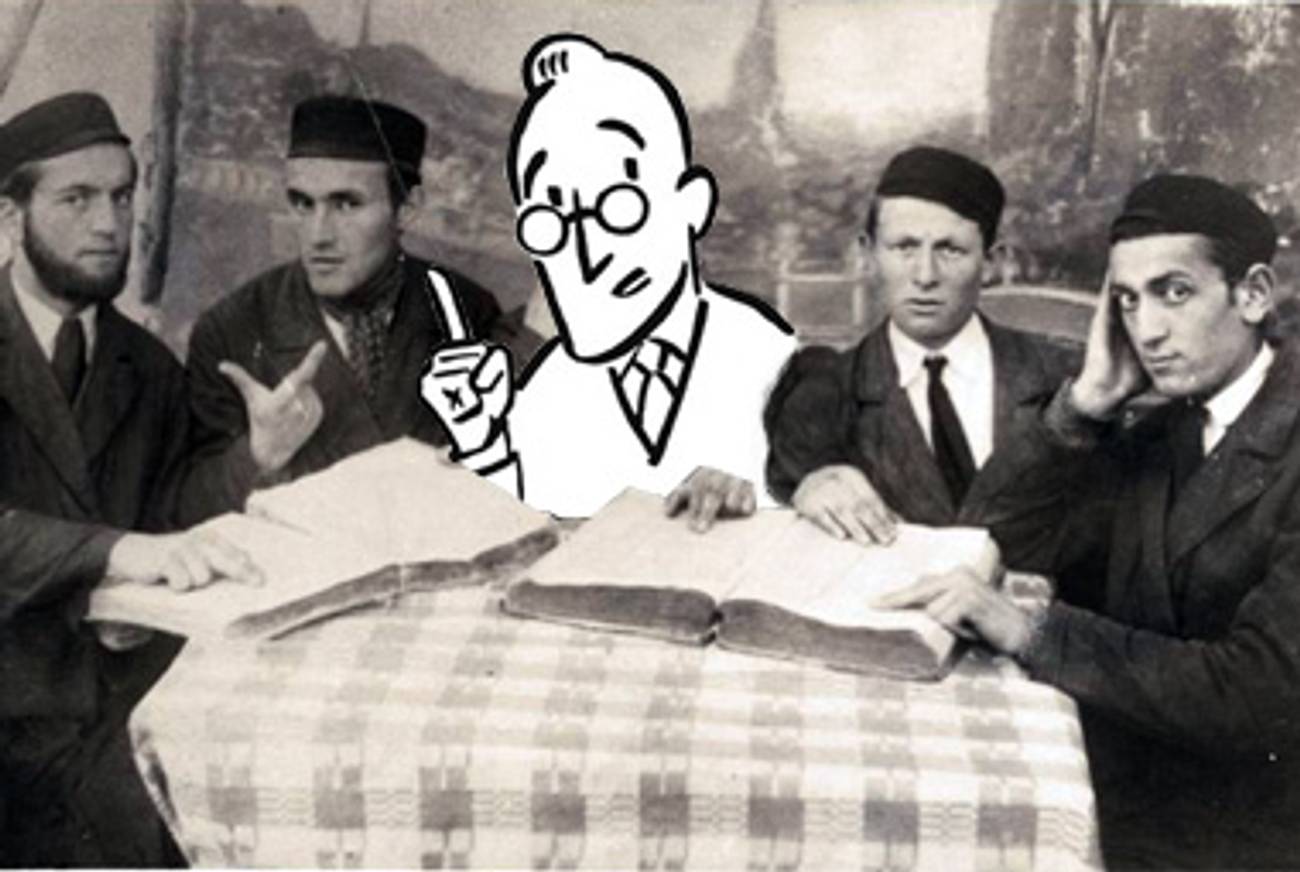Ethical Vulture
As The Ethicist—and in a new play—Randy Cohen aims to edify but settles instead for the easy laugh




Dear Ethicist,
Like those poor souls you advise every week in “The Ethicist,” your popular New York Times Magazine column, Leslie White, the hero your play The Punishing Blow, has both a complaint and a defense. White is utterly secure in the knowledge that he is right, and it is obvious from the first minute of the play that he is utterly wrong. The anti-Semitic White tries to make himself the victim, grumbling that his brand of hatred cannot survive Jewish assimilation. “Where are the colorful ethnic stereotypes of my childhood?” he asks in one of many outlandish quips that was designed to get a laugh. White is an “Ethicist” letter-writer in 3-D.
Watching the play, I thought how tedious it must be for you to weigh in, year after year, on such trifling matters as whether a synagogue should pay for the damage incurred if a piece of wood falls on a car while it is parked in the house of worship’s parking lot. (You said: No.) Or on a non-religious Jew who hoped that it was ethical to wear a yarmulke in order to get a discount in a camera store owned by Hasidim. (You said: Don’t do it.) You must long for some graver or more exotic ethical situation.
But if The Punishing Blow is a column staged, it also seems like a defense against those who criticize you, an argument for the limitations of ethics in a newspaper column. Perhaps you are jabbing at critics—especially your Jewish critics—skeptical about your qualifications. The skepticism started with a fateful 2002 column in which you took the side of a woman deeply offended by the Orthodox real-estate broker who refused to shake her hand. Orthodox writers asked back then: In what area do your Jewish credentials reside, exactly, Ethicist?
In The Punishing Blow, which is being performed in New York through August 28, you answer with a left hook when you make Leslie White, a college professor, fail to overcome his anti-Semitism after studying a noble Jewish historical figure. Arrested for hate speech and drunkenness—a situation borrowed from Mel Gibson’s 2006 anti-Semitic tirade—White has other problems, like losing his marriage and his job. But whereas Gibson recanted and paid a fine, White gets the opportunity to atone by delivering a public lecture about one of the hundred most famous Jews of all time. After cracking jokes about No. 1 (Moses), White picks the 18th-century British Jewish boxer Daniel Mendoza, who, in your telling, invented a ferocious style of fighting, changed the sport’s history, and made anti-Semitism disappear. Writing on a white board and accompanied by slides, White talks the audience through Mendoza’s life, his supposedly homoerotic relationship with a Christian boxer, his marriage, his rousting his enemies, his meeting King George III. Mendoza was David overturning the Goliath of anti-Semitism.
After all this, White, who hates boxing, is still an anti-Semite. “One’s mind cannot be changed,” he says. He delivers a speech about how, in “the new drama,” the hero learns nothing.
But while your play argues against the possibility of persuading anyone to do the right thing, off stage, you still seem to believe. In a compilation of your columns, a “guest ethicist,” a rabbi at Manhattan’s Park Avenue Synagogue, asked whether one should say anything in the face of evil, answered that persuading people of the error of their ways only goes so far. Your counsel: You should always try and persuade the evil-doer. About the role of Jewish teachings in your column, you have been candid. You don’t use them, you told the Metrowest Jewish News in 2010. You hardly go to synagogue. Though you have never claimed to be heir to any great sage, describing “The Ethicist” as “flattening out ethical positions,” Jews figure in about one-fifth of the columns. (I’m including columns that use Jews to make a point as well as those dealing with Jewish questions.) In the end, your most readily identifiable Jewish quality is your comic neurotic persona, and those you enrage the most with this persona seem to be other Jews.
No letter has brought more wrath than the 2002 missive from a woman complaining that her Orthodox real-estate broker declined to shake her hand. It began innocuously enough, as the writer wanted to be tolerant of other faiths but lamented that “as a feminist,” she opposed bias. You took the feminist’s side, comparing what the broker had done to pre-Brown v. Board of Education segregationist politics and writing, “I believe you should tear up your contract.”
The Times received over 4,000 letters in response to this column and was forced to meet with the Orthodox Union to get “sensitized” to their concerns. You alleged that the broker’s refusal to shake hands with the woman was gender discrimination. On blogs, and in newspapers including the Jerusalem Post, Orthodox writers protested that you misunderstood the custom of refraining from touching the opposite sex and claimed that your lack of sympathy made a mockery of your honorific title.
The column still apparently bugs you and the newspaper you write for. You referred to it last year on your blog, The Moral of the Story, and a couple weeks ago, Deborah Solomon asked, in a Times Magazine interview with the Chabad-Lubavitch leader Yehuda Krinsky, “You wouldn’t ever shake my hand, would you?”
After the handshake column, you seemed to play factions of American Jewry off of each other: If you criticized the Orthodox for their dismissal of women, you also took down secular Jews who exaggerate their religiosity: the Jews asking whether it was OK to pretend that their dishes are kosher when observant relatives come over for Passover, the person who wanted to know if it was OK to lie about a turkey’s “kosherness,” the autophile trying to weasel out of a self-induced prohibition against German cars in order to buy a late model BMW. You excoriate them all.
But I disagree with those who criticize you for not being Jewish enough. They misunderstand you. Your Jewishness lies in your role as satirist. Your touchstones are Woody Allen, Mel Brooks, and the Catskills, not Maimonides, the Torah, and the Talmud. There are no Talmudic citations at the bottom of your column. Your advice is not doled out in the privacy of the Rebbe’s office, but you are working as hard trying to “get over” on your audience, the Times reader, as turn-of-the-century burlesque comics did in slipping on banana peels in their crumbling theaters. At the same time, you recall the judge in The Punishing Blow, wielding an ancient device—shame—to make the reader chuckle at the squirming letter-writers’ expenses. At a time when all religious figures are pressured to be entertainers, when, as one member of the clergy recently wrote in another context in the Times, “a huge loss of belief in the fundamental narratives of Christianity and Judaism, the Biblical concepts of divinity” is responsible for the burn out of religious leaders, you’re ahead of the curve. “The Ethicist” as reality TV series: The Philosopher Jew?
My objection to “The Ethicist” is that your persona, as entertainingly tormented as it is, can distract from the most tantalizing and novelistic details of the letter-writers’ lives. In other words, you sometimes miss the point while joking. A few weeks ago, an Orthodox woman who had discovered through “sophisticated research” that a man she had been dating was a trans-gender person, asked if she should out him to her rabbi. (He was also a recent convert to Judaism.)
Your first response: “I get exhausted if I change my sport coat.” Then you answered: The letter-writer should not tell the rabbi, but she could tell some of her friends. You compared the transgender person who declines to divulge his/her sexual identity to the lout who declines to divulge an STD.
Transgender people objected that hiding an STD was nothing like concealing the fraught story of gender-swapping to a potential romantic interest. But the real subjects of this column, sacrificed to the sport-coat joke, are the tantalizing fact of a transgender person converting to Orthodox Judaism and the sad one of a woman using “sophisticated research” to vet her dates.
“People submit questions to The Ethicist to get wiggle room from a higher authority,” you have said, revealing that you are aware that your function is closer to a judge on Project Runway than a rabbi. But you do have an ethical code, albeit a secular humanist one. Its tenets include tolerance: Don’t treat people based on religious preference. (You acknowledge tolerance has its limits when harm is involved, though you have never weighed in on how the Orthodox broker was harming anything except the letter-writer’s self-esteem.) Democracy: You subscribe to an expansive version, which claims that you don’t have to adhere to the faith of the religious organization you work for, and, more sensibly, that a minority is not solely responsible for advocating for itself. Despite your claim that Jewish teachings play no role in your column, you are most Jewish when joking about the Jews. Answering a man who never turned his co-worker in for inventing Jewish holidays, you wrote, “My head says its wrong but my heart says ‘mazel tov.’ ” (You argued that anyone who did not know when the holidays were deserved to be fooled, earning the wrath of some anti-Semitic bloggers.)
In an enlightening 2002 mini-history of the advice-column genre, you explain yourself as part of a bigger trend: “Traditionally, advice givers, whether columnist or clergyman or grandmother, were valued for their personal opinions, the distillation of their experience and insight. What [Eppie] Lederer”—better known as Ann Landers—“increasingly offered was not the guidance of a sagacious amateur but a referral to a trained professional.”
You have punched Lederer’s sanitized advice-giving into a new figure: the post-modern tummler.
—A dedicated reader
Rachel Shteir is the author of three books, most recently Gypsy: The Art of the Tease.
Rachel Shteir, a professor at the Theatre School of DePaul University, is the author of three books, including, most recently, The Steal: A Cultural History of Shoplifting. She is working on a biography of Betty Friedan for Yale Jewish Lives.